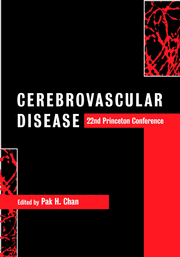Book contents
- Frontmatter
- Contents
- List of contributors
- Preface
- Acknowledgments
- Part I Special lectures
- 1 Zinc toxicity in the ischemic brain
- 2 Central nervous system ischemia: diversity among the caspases
- Part II Oxidative stress
- Part III Apoptosis
- Part IV Hot topics
- Part V Hemorrhage, edema and secondary injury
- Part VI Inflammation
- Part VII Gene transfer and therapy
- Part VIII Neurogenesis and plasticity
- Part IX Magnetic resonance imaging in clinical stroke
- Part X Risk factors, clinical trials and new therapeutic horizons
- Index
- Plate section
1 - Zinc toxicity in the ischemic brain
from Part I - Special lectures
Published online by Cambridge University Press: 02 November 2009
- Frontmatter
- Contents
- List of contributors
- Preface
- Acknowledgments
- Part I Special lectures
- 1 Zinc toxicity in the ischemic brain
- 2 Central nervous system ischemia: diversity among the caspases
- Part II Oxidative stress
- Part III Apoptosis
- Part IV Hot topics
- Part V Hemorrhage, edema and secondary injury
- Part VI Inflammation
- Part VII Gene transfer and therapy
- Part VIII Neurogenesis and plasticity
- Part IX Magnetic resonance imaging in clinical stroke
- Part X Risk factors, clinical trials and new therapeutic horizons
- Index
- Plate section
Summary
Growing evidence indicates that the brain's heightened vulnerability to ischemia, in large part, reflects a propensity for its intrinsic cell–cell and intracellular signaling mechanisms, normally responsible for information processing, to turn lethal under ischemic conditions. The most extensively studied example of such a signaling mechanism is that mediated by the excitatory neurotransmitter glutamate. In health, glutamate mediates most fast excitatory neurotransmission, but, under ischemic conditions, glutamate floods out from both neurons and astrocytes, building up in the extracellular space and becoming a killer that facilitates excess calcium entry into neurons, contributing to their demise.
Two Princeton Conferences ago, that is in Memphis in 1996, I presented then emerging evidence from my laboratory supporting the idea that another neurotransmitter released from excitatory nerve terminals might become a killer in the ischemic brain: the metal zinc. Besides the “transmitter killer” parallel to glutamate, I noted that there was also a parallel between zinc and calcium, in that both were divalent cation metals mediating ischemic neuronal death via excess influx across the plasma membrane.
A substantial body of evidence suggests that zinc is a neurotransmitter/neuromodulator [reviewed by refs. 2–4], although this possibility has had, to date, a rather low profile within the scientific community. The central nervous system contains a pool of relatively free zinc, separate from the zinc tightly bound to metalloenzymes and transcription factors in all cells.
- Type
- Chapter
- Information
- Cerebrovascular Disease22nd Princeton Conference, pp. 3 - 8Publisher: Cambridge University PressPrint publication year: 2002



